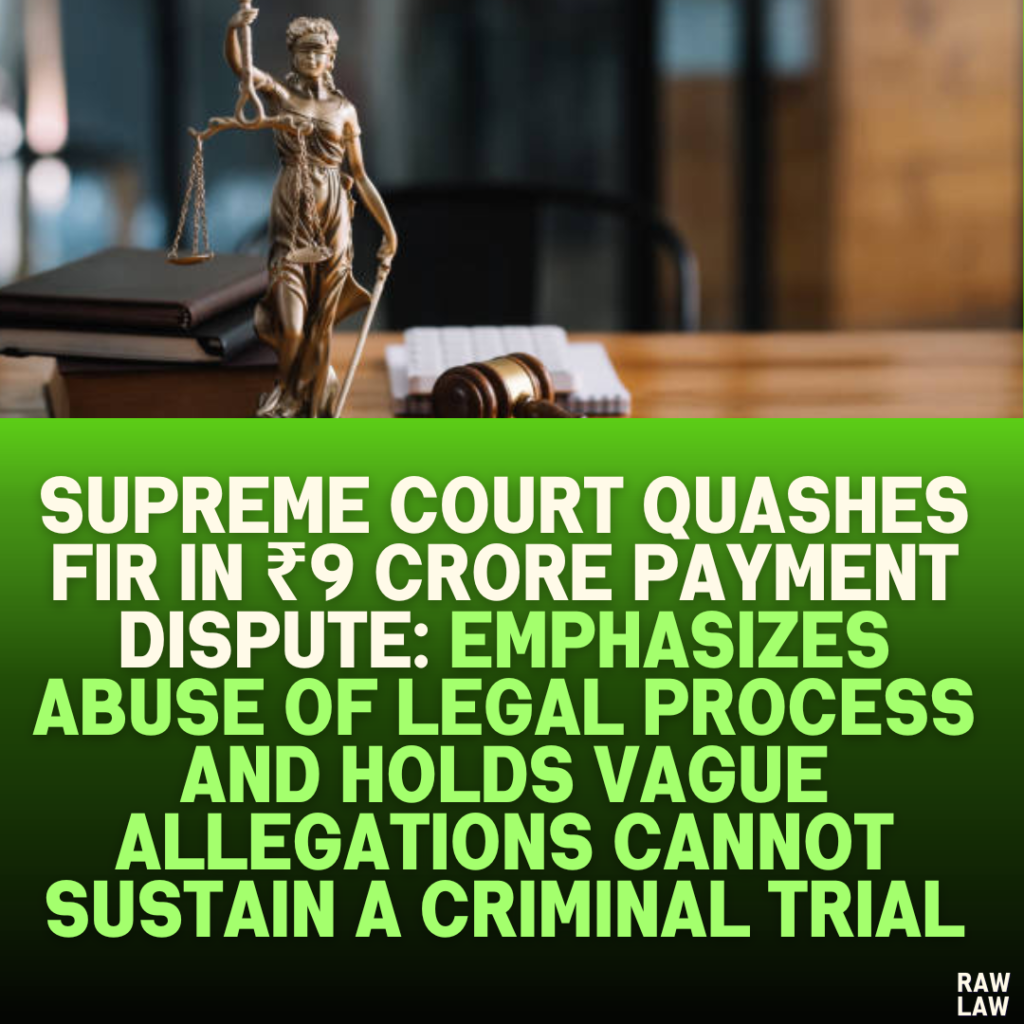Court’s Decision
The Supreme Court of India allowed the appeal, overturning the Allahabad High Court’s decision, and quashed FIR No. 64/2020 registered against the appellant at Police Station Sadar Bazar, Meerut. The Court held that the FIR lacked specific allegations against the appellant and concluded that continuing the proceedings would amount to an abuse of legal process.
The Court emphasized that the allegations in the FIR, even if taken at face value, failed to disclose the commission of any offense by the appellant or the company he represented. The Supreme Court exercised its extraordinary powers to quash the FIR, ensuring that the appellant would not be subjected to unwarranted trial proceedings.
Facts
- Background of the Contractual Relationships:
- Hyundai Motor India Limited (HMIL) awarded a construction contract to Hyundai Engineering & Construction India LLP (HEC India LLP), where the appellant was the Project Manager.
- HEC India LLP subcontracted the work to KOTEC Automotive Services India Private Limited (KOTEC), which further subcontracted to YSSS India Construction (YSSS).
- YSSS subcontracted manpower supply to the complainant’s company, M/s RT Construction.
- Allegations in the FIR:
- The complainant alleged that payments totaling ₹9 crores, due for manpower supply, were defaulted upon.
- Of the ₹9 crore due, ₹1.7 crore was paid in installments, and cheques worth ₹8.31 crore were issued but dishonored.
- The complainant accused YSSS and others of fraudulent intentions, including forging documents and issuing threats.
- Filing of FIR:
- The FIR, registered under various IPC sections, including 406 (Criminal Breach of Trust), 420 (Cheating), and 120-B (Criminal Conspiracy), implicated the appellant alongside others. However, specific allegations were made only against YSSS and its associates.
- Proceedings Before High Court:
- The appellant moved the Allahabad High Court to quash the FIR, arguing it lacked specific allegations against him. The High Court refused, prompting the present appeal to the Supreme Court.
Issues
- Did the FIR disclose any cognizable offense against the appellant?
- Was the High Court justified in refusing to exercise its powers to quash the FIR under Article 226 of the Constitution and Section 482 of the CrPC?
- Would continuing the criminal proceedings against the appellant constitute an abuse of legal process?
Petitioner’s Arguments
The appellant advanced the following arguments:
- The allegations in the FIR were vague and did not specify any criminal act committed by him or HEC India LLP.
- The complainant’s grievances were essentially civil in nature, involving non-payment of contractual dues.
- The proceedings were mala fide, initiated to recover a civil liability and exert undue pressure on the appellant.
- The continuation of the FIR against the appellant would result in harassment and miscarriage of justice.
Respondent’s Arguments
The respondents contended:
- The FIR sufficiently outlined a criminal conspiracy and fraudulent acts involving multiple parties, including the appellant.
- The allegations warranted an investigation to uncover the truth, given the dishonor of cheques and alleged threats.
- The High Court appropriately refused to quash the FIR, allowing due legal process to continue.
Analysis of the Law
The Supreme Court analyzed the power of courts to quash FIRs under Article 226 of the Constitution and Section 482 of the CrPC. It referred to:
- State of Haryana v. Bhajan Lal: The Court reiterated that FIRs could be quashed in cases where:
- Allegations do not constitute an offense.
- FIRs are frivolous or maliciously instituted.
- Allegations are vague or inherently improbable.
- Pepsi Foods Ltd. v. Special Judicial Magistrate: High Courts can use judicial review to prevent the abuse of legal process and secure justice.
- State of Andhra Pradesh v. Golconda Linga Swamy: FIRs that fail to disclose an offense, even without adding or subtracting content, should be quashed.
- Mohammad Wajid v. State of U.P.: Courts must examine not only the FIR but also the overall circumstances to ascertain whether a prima facie case exists.
Precedent Analysis
The Court discussed earlier judgments emphasizing:
- The need for specific allegations to proceed with a criminal trial.
- The High Court’s obligation to prevent frivolous or vexatious proceedings.
- The distinction between civil disputes and criminal cases.
Court’s Reasoning
- No Specific Allegations Against the Appellant:
- The FIR, upon detailed examination, failed to disclose any specific act of fraud, conspiracy, or misappropriation by the appellant or HEC India LLP.
- The allegations were primarily directed at YSSS and its associates.
- Civil Nature of the Dispute:
- The allegations stemmed from a contractual payment dispute, fundamentally civil in nature.
- The complainant used criminal proceedings as leverage to recover dues.
- Abuse of Legal Process:
- Forcing the appellant to face criminal proceedings for vague allegations would constitute an abuse of process and lead to miscarriage of justice.
Conclusion
The Supreme Court quashed the FIR and related proceedings, holding that:
- The allegations in the FIR, even if taken as true, did not disclose any cognizable offense by the appellant.
- The High Court erred in refusing to exercise its powers under Article 226 of the Constitution and Section 482 of the CrPC.
The judgment directed that the appellant should not be subjected to unwarranted legal harassment.
Implications
This ruling reinforces the principle that criminal law cannot be misused to settle civil disputes. It serves as a reminder that FIRs must contain specific and actionable allegations to justify criminal proceedings. Courts are empowered to intervene at the investigation stage to prevent the misuse of legal processes and ensure justice.




Pingback: Supreme Court Quashes FIR in Property Dispute, Highlights "Predominantly Civil Nature of the Case" and Rules Property Disputes Must Be Addressed as Civil Matters Unless Fraudulent Intent Is Evident - Raw Law